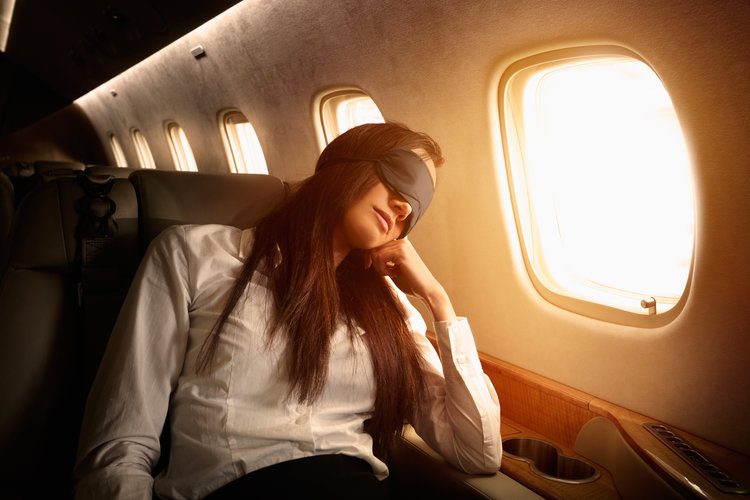By Aly Walansky – Original Article
As much as we love to travel, the flight itself can be something of an ordeal — and worst of all are those long-haul all-nighters. (Right, Lisa Rinna?) We know the secret to feeling fresh and ready to explore upon our arrival is to get some rest in flight, but sometimes falling asleep feels absolutely impossible. To help us get there, experts shared their 13 tips for restful slumber on board — so read on and cherry-pick the insight that works best for you. (Now shhhh… night night!)
1. Prep for sleep before boarding.
“When approaching an overnight flight, I try to use the few hours beforehand to relax and drink plenty of water, so that I won’t wake up every hour needing to hydrate. I get a chamomile tea (or bring your own favorite tea bags) to sip while reading or watching a movie and avoid working because it fires up my brain rather than sending my body the message that it’s time to unwind,” says travel expert Erica Gragg of Escape to Shape.
2. Create your own shade.
“I need total darkness to sleep, so I always travel with a blackout eye mask,” Gragg says. Other comforting things to consider bringing: lavender lotion or essential oil, and warm, cozy socks.
3. Pick a window seat.
It’s easier than trying to fall asleep on a neck pillow while basically sitting upright. This way, says Greg Geronemus, co-C.E.O. of New York-based tour company SmarTours, you can also control your light exposure. “I use either a blanket or a pillow as a cushion against the side of the plane,” says Geronemus.
4. Dress comfy.
Light, loose-fitting clothing is the key. “Sure some people like to be fashion plates, but my view is sweats or loose-fitting sweaters, loose jeans, comfortable socks work best. Also an eye mask and earplugs, or a good pair of noise-canceling earbuds tends to block out the noise and the light, further aiding me in slumber,” says Andy Abramson, who was named “Business Traveler of the Year” last year by Business Traveler Magazine.
5. Don’t cross your legs.
When you cross your legs, you can restrict blood flow and increase your chances of a blood clot, says Geronemus. Or, it could cause you pain when you awake.
6. Recline your seat.
Reclining your chair will help ease some of the pressure on your lower spine, says Geronemus. With less pressure on your back, it’ll be easier to fall asleep.
7. Watch what you eat — and drink.
The old saying you are what you eat applies to sleeping on planes. “I prefer carbs to make me sleepy just before a flight or on the plane. Pasta, pizza, pancakes, sandwiches are great as they make you sleepy naturally,” says Abramson. Avoid coffee, tea, and alcohol. “The first two act as stimulants, while the latter metabolizes as sugar and gives you jolt three or four hours later, waking you up mid-flight,” says Abramson.
8. Pop a pill.
“On long-haul International flights, I find that the above process works to a point — but a sleep aid like Ambien or Lunesta (which I prefer) has the best effect. On those flights I time things to where I’m going to help minimize jet lag. That means one Lunesta just before dinner results in almost seven hours of sleep on a 10- to 12-hour flight,” says Abramson.
9. Adjust your buckle.
The key to avoiding interrupted sleep is to buckle your seatbelt over your blanket or sweater, not under it. That way, the flight attendant can see that you’re buckled up and won’t wake you if there’s turbulence.
10. Get some exercise.
Whenever possible, do some slow stretches before you board or, if room permits, in the back of the plane — or even in the restroom. “Slow stretches will release muscular tension (especially all the stress of getting through airport security) and help prepare you for sleep,” says frequent traveler Nancy Gerstein, C.E.O. of CreativeMarketing Associates and yoga teacher.
11. Surrender.
The more anxious you make yourself about not sleeping, the more sleep will elude you. “So drop the internal dialogue about what a horrible day you’ll have if you don’t get to sleep immediately. The key to sound sleep lies in surrendering, not in trying harder. Once you feel yourself dozing off, focus on your breath and your deep exhales, and clear your mind. If you have a mantra or a happy peaceful place, let your mind rest there,” says Gerstein.
12. Try a relaxation practice.
“Taking a few minutes to do a short relaxation exercise just before you doze off is an excellent way of letting go,” Gerstein says. “Great benefits can be gained by simply drawing your weight into the seat and allowing the back of the seat to support you. Close your eyes and systematically address every part of your body, mentally telling it to relax and let go. Surrender to gravity.”
13. Set your watch.
“I always try to set my clock to the time at my destination, to help prepare myself for what lies ahead,” says Gragg.
